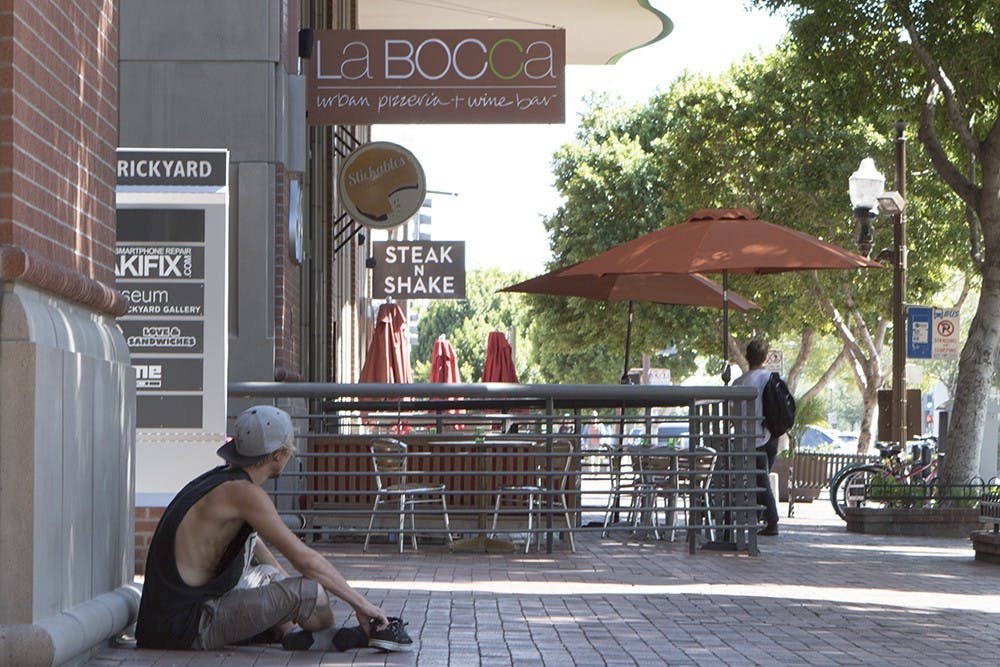For decades, homelessness has festered in the U.S. and needy people were sewn right into the fabric of our society. But not anymore.
Finally, we have discovered a way to eradicate the biggest and most problematic nuisance on the streets — the homeless. With innovative and forward thinking laws in great cities of American lore, policy makers have found a way to completely remove the annoyance of homelessness.
Los Angeles has been a forerunner in this practice due to expert locals; with such big heads they don’t even need hearts. For years, this city has been managing the issue of homelessness with the most evolved forms of human intelligence ever known to mankind. The city's basic principle upholds the ancient truth that the well being of a society rests upon the well being of a few select individuals, while employing the effective tools of prejudice and discrimination.
How else did migrating Europeans and our forefathers build up the greatest nation in the world? By ridding society of unwanted groups of people which is good for all.
L.A. has formed laws that do just that by prohibiting the acts of sleeping (even sitting) on the sidewalks, holding belongings in certain public spaces, and asking people in passing for change, all of which makes it extremely difficult for the homeless of the city to survive.
Now, L.A. lawmakers have issued two ordinances to encourage the seizure of the property of homeless people. This is pure genius. It was all developed by a local celebrity who realized shab was the new chic and wanted to kill two birds with one stone … with one of the birds being a homeless person.
In response to a Venice Beach-side home invasion from a mentally ill homeless man, local leader Mark Ryavec said, “The people that are at risk here on a constant basis are the residents (not the homeless).”
Now, let’s be serious.
If mental illness exists within a society, there is a reason. This problem stems further back than one man’s irrational one-time decision. Mental illness can be treated and it most often originates from a gene pool or one’s surroundings. But even when it is genetic, it is heavily influenced and triggered by one’s surroundings.
The majority of the homeless are not drug addicts. The majority is composed of mentally ill, disabled, veterans, survivors of domestic violence, families, children and those who can’t find a way out of homelessness due to the structure of our societies. As pointed out in the satirical essay, "Why Are the Homeless Homeless?," general requirements for getting a job including dress clothes, a residence, a phone number and a way of transporting to the job — are not ones that a homeless person has the means for fulfilling, creating a situation of chronic homelessness.
If you were taken care of when you were in need of food, clean water, shelter or medicine, especially in your childhood, then consider yourself lucky.
In today’s global universe of bustling human growth, one billion children of the global population of roughly seven billion are living in poverty. According to UNICEF, 22,000 children die due to poverty each day.
Despite this fact, the collective society chooses to turn away from those in need. Even the wealthiest nation on the planet has poverty and a lack of livelihood for all. One in six people in America face hunger and one in seven people are enrolled in the Supplemental Nutrition Assistance Program, half of them are children.
Besides this, there are cities in the U.S., which form laws to make it more difficult to be homeless than it already is. Joining Los Angeles is Philadelphia, which banned offering free food services in public. Not to mention, Orlando, Florida has banned offering groups of food to people. In Nevada City, California it is illegal to live in tents, automobiles or sleep in the woods.
Kalamazoo, Florida criminalized sleeping on park benches, making the infraction remain on a personal record, which then prevents the homeless from applying for housing. St. Petersburg, Florida enacted laws making it illegal to beg or sleep outdoors with a penalty of $500 fine or 90 days in jail. Unfortunately, the list of cities with theses types of laws does not stop there. Tempe is also a culprit.
Just last January, Tempe issued an ordinance making it unlawful for anyone to sit or lie down on a public sidewalk. This ordinance was amended in November 2014, making it unlawful to obstruct the public right-of-way unless it's a medical emergency. Business owners of Tempe are in favor or reinstating the more restrictive January ordinance, due to the supposed negative influence of homeless populations near their businesses.
It is extremely common for the largest, most acclaimed cities to attract homeless populations in need or raise the standard of living and put many people in need of more assistance. Among the list of the top 25 cities with the highest rates of homelessness are: New York City, Los Angeles, Moscow, Mexico City, San Diego, Athens, Seattle, San Francisco, Baltimore, Tokyo, Chicago, Washington, D.C., Rome, and Denver.
As you can tell, U.S. cities make up almost half the list.The issue of homelessness within cities will not be solved through rampant forms of gentrification and the denial of basic human rights. We need to rethink our system.
Related Links:
Editorial Board's take: Mill Avenue and homelessness don't mix, say some business owners
Unheard voices of Phoenix's homeless youth
Reach the columnist at ralydfor@asu.edu or follow @ralydford on Twitter.
Editor’s note: The opinions presented in this column are the author’s and do not imply any endorsement from The State Press or its editors.
Want to join the conversation? Send an email to opiniondesk.statepress@gmail.com. Keep letters under 300 words and be sure to include your university affiliation. Anonymity will not be granted.
Like The State Press on Facebook and follow @statepress on Twitter.




